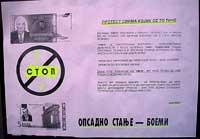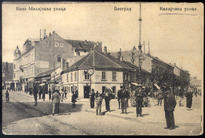Site search
Pre 22 godine iy Nisa sam dobila na poklon stihove pesme...in Kazandžijsko sokače (Coppersmith's Alley)
Najbolja jagnjetina u gradu, uz Bovinovu tamjaniku -...in Mali podrum (English explanation or translation: Small Basement)
Totalni neprofesionalizam,već drugi put ,iako sam...in Оrač (English explanation or translation: The Plowman)
Pa jel ima salata il nema?! Samo dunja i kisela?in Kod Šipe-Kamenički vis (At Šipa's-Kamenički vis Resort)
Haaahhha. I'm not too bright today. Great post!in Оrač (English explanation or translation: The Plowman)
Interesting facts
We are Going to Defend It to the Last Drop
The most energetically, with all the strength of alcohol and non-alcohol consumers, we protest against turning our dear second house "Pod lipom" (in English, "Under the lime tree") into a Greek fruit and vegetable store. Notorious is the fact that we don't need food when we...
Literature
The „Аlbanija“ ("Albania") Kafana
The "Albanija" (also, "Albania" in English) kafana, together with a clock which was standing in front of it, was a centre of gathering of the town's bohemians and passers-by for decades. A nondescript house which standed for a mockery and was, as described by Branislav...
A Niš's Bohemian
AVDA ZEKIĆ, the famous Niš's bohemian and drunkard, born at the beginning of the 30's of the 20th century in Niš, in a part of the town called Čair. He was a house painter by profession, but not rarely was he to put aside his job for 'kafančenje' (this is a Serbian term used when referring to going to a kafana, eating, singing and getting drunk all night long). Even though he loved to spend a lot of time in kafanas and to drink with anyone willing to pay him that drink, he wasn't a usual 'birtijaš' (also a Serbian term used to refer to somebody who visits nondescript kafanas full of smoke, rakija-Serbian brandy- is the main choice of drink, guests present are mostly alcoholics, and if there is any kind of band-music usually sucks) as the ones you can often see in Niš's kafanas today.
Avda Zekić was always elegantly dressed, wearing a suit's jacket and a shirt both it the summer and in the winter, mainly speaking in old Niš's dialect, throwing in a few Gypsy words from time to time. Although he was a Gypsy, he rarely hanged out with the Gypsies, he used to say: 'Thank God I'm a Gypsy when I'm not a peasant.' He classified bohemians into those who have the money and those whose drinks are paid by the ones with the money. Non-bohemians were classified into good and bad people.
He could mostly be seen in "Galija" ("Galley"), "Stara Srbija" ("Old Serbia"), "Atina" ("Athens"), "Kalča", "Marger", "Leskovac"... He rarely drank wine or beer, mainly rakija, and he almost never ate except for pumpkin seeds and chickpeas. He loved to introduce himself as "Avda Zekić-a Spanish actor from Leibzig", even though he never left Niš to travel except when he went to serve the army. Being a good-humoured and merry man, Niš's bohemians or other citizens of Niš were always glad to see him.
Niš's playwright Pavle Lalović wrote a drama using the motives of Avda's life "Pali anđeli" ("Fallen Angels" in English") which was played for some time on the small stage of the Niš's National Theatre, and in 1995. he published a book named "Avda Zekić- a Spanish actor from Leibzig".
02.07.2008.






